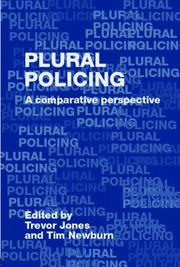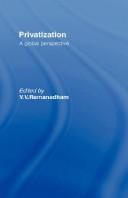| Listing 1 - 2 of 2 |
Sort by
|

ISBN: 9780415355117 0415355117 0415355109 9780415355100 0203001796 9780203001790 9781134255702 9781134255740 9781134255757 Year: 2006 Publisher: Milton Park, Abingdon, Oxon ; New York, NY : Routledge,
Abstract | Keywords | Export | Availability | Bookmark
 Loading...
Loading...Choose an application
- Reference Manager
- EndNote
- RefWorks (Direct export to RefWorks)
Policing is changing rapidly and radically. An increasingly complex array of public, private and municipal bodies - as well as public police forces - are now engaged in the provision of regulation and security. It is, therefore, widely recognized that policing has become increasingly "pluralized" in many countries. This relates to three key developments across the globe: The huge expansion of the commercial security sector since the 1970s The increasing "market pressures" and importation of business management techniques from the private sector, coupled with increasingly strict regimes of performance targets and monitoring placed on state police forces The emergence of new forms of patrol provision that can be distinguished both from commercial security and traditional state constabularies. "Plural policing" is now a central issue within criminology and police studies throughout the world, and there is a growing body of research and theory concerned with its extent, nature and governance. To date, however, this work has been dominated by Anglo-American perspectives. This volume takes a detailed comparative look at the development of plural policing, and provides the most up-to-date work of reference for scholars in this field. Edited by two leading authorities on policing, and including individual contributions from internationally recognized experts in criminology and police studies, this is the first ever volume to focus on "plural policing" internationally, and to draw together empirical evidence on its developments in a formal comparative framework.
Law enforcement --- Police --- Privatization --- Industries --- Community policing --- Security measures --- Denationalization --- Privatisation --- Contracting out --- Corporatization --- Government ownership --- Cops --- Gendarmes --- Law enforcement officers --- Officers, Law enforcement --- Officers, Police --- Police forces --- Police officers --- Police service --- Policemen --- Policing --- Criminal justice, Administration of --- Criminal justice personnel --- Peace officers --- Public safety --- Security systems --- Enforcement of law --- Industrial production --- Industry --- Economics --- Community-based policing --- Community-oriented policing --- COP (Community-oriented policing) --- Neighborhood policing --- Policing, Community --- Proximity policing --- Legal status, laws, etc. --- Industries, Primitive --- Law enforcement - Cross-cultural studies --- Police - Cross-cultural studies --- Privatization - Cross-cultural studies --- Industries - Security measures - Cross-cultural studies --- Community policing - Cross-cultural studies

ISBN: 0415075661 9780415075664 Year: 1993 Publisher: London Routledge
Abstract | Keywords | Export | Availability | Bookmark
 Loading...
Loading...Choose an application
- Reference Manager
- EndNote
- RefWorks (Direct export to RefWorks)
-Denationalization --- -Instrumenten van de economische politiek. Economische orde. Economisch politieke maatregelen. Stabilisering. Stimuleringsmaatregelen. Regulering. Financiele steunmaatregelen --- -338.24 Instrumenten van de economische politiek. Economische orde. Economisch politieke maatregelen. Stabilisering. Stimuleringsmaatregelen. Regulering. Financiele steunmaatregelen --- Privatization --- 338.24 --- 338.24 Instrumenten van de economische politiek. Economische orde. Economisch politieke maatregelen. Stabilisering. Stimuleringsmaatregelen. Regulering. Financiele steunmaatregelen --- Instrumenten van de economische politiek. Economische orde. Economisch politieke maatregelen. Stabilisering. Stimuleringsmaatregelen. Regulering. Financiele steunmaatregelen --- Denationalization --- Privatisation --- Contracting out --- Corporatization --- Government ownership --- Cross-cultural studies --- Public economics --- Cross-cultural studies. --- Privatization - Cross-cultural studies
| Listing 1 - 2 of 2 |
Sort by
|

 Search
Search Feedback
Feedback About UniCat
About UniCat  Help
Help News
News